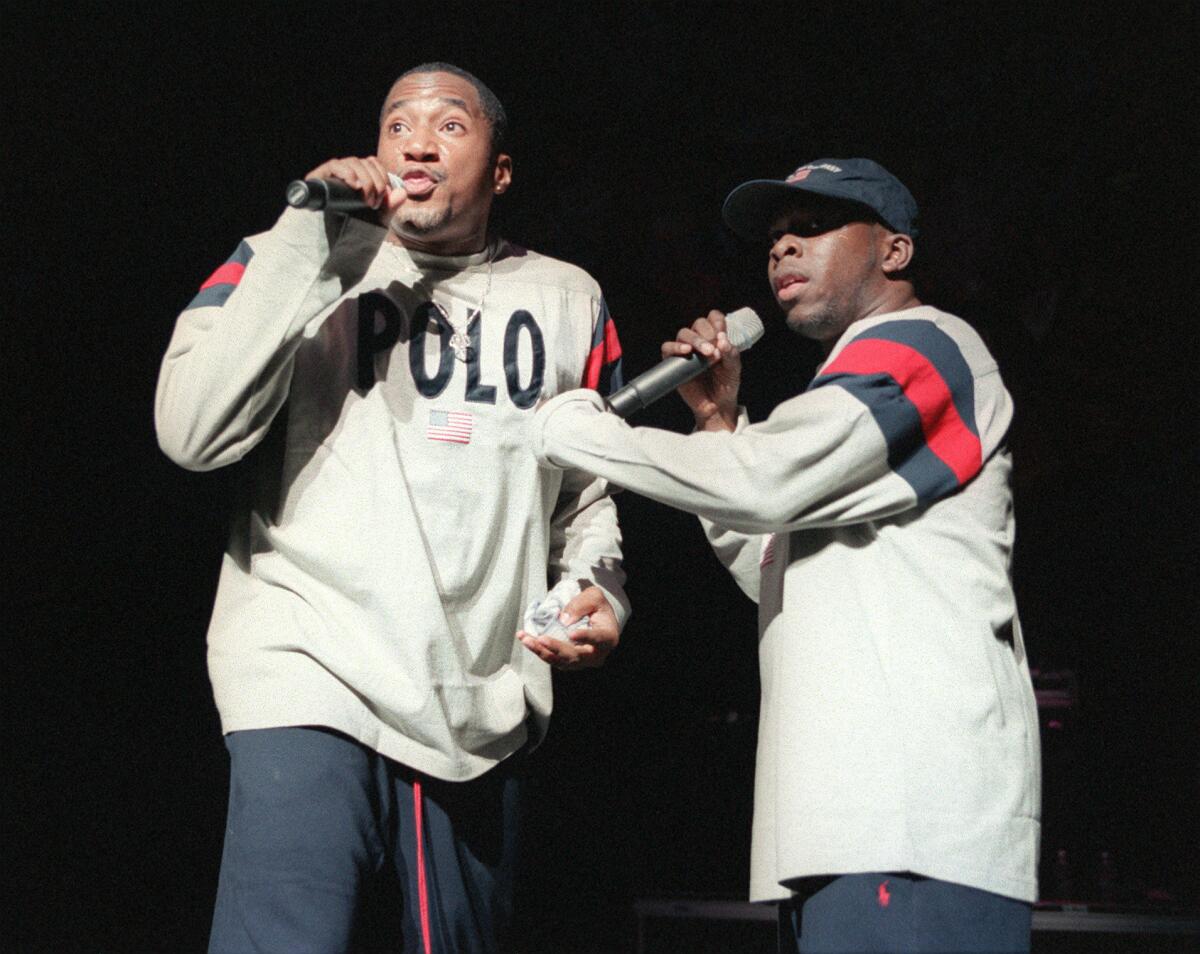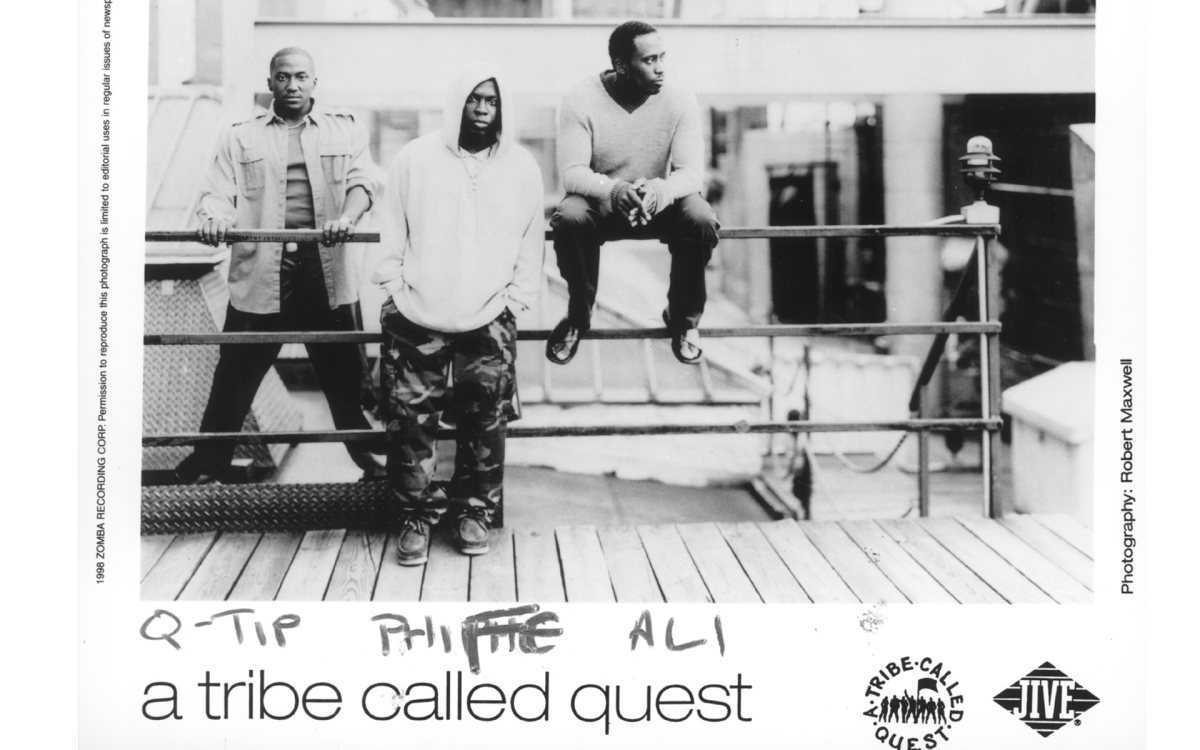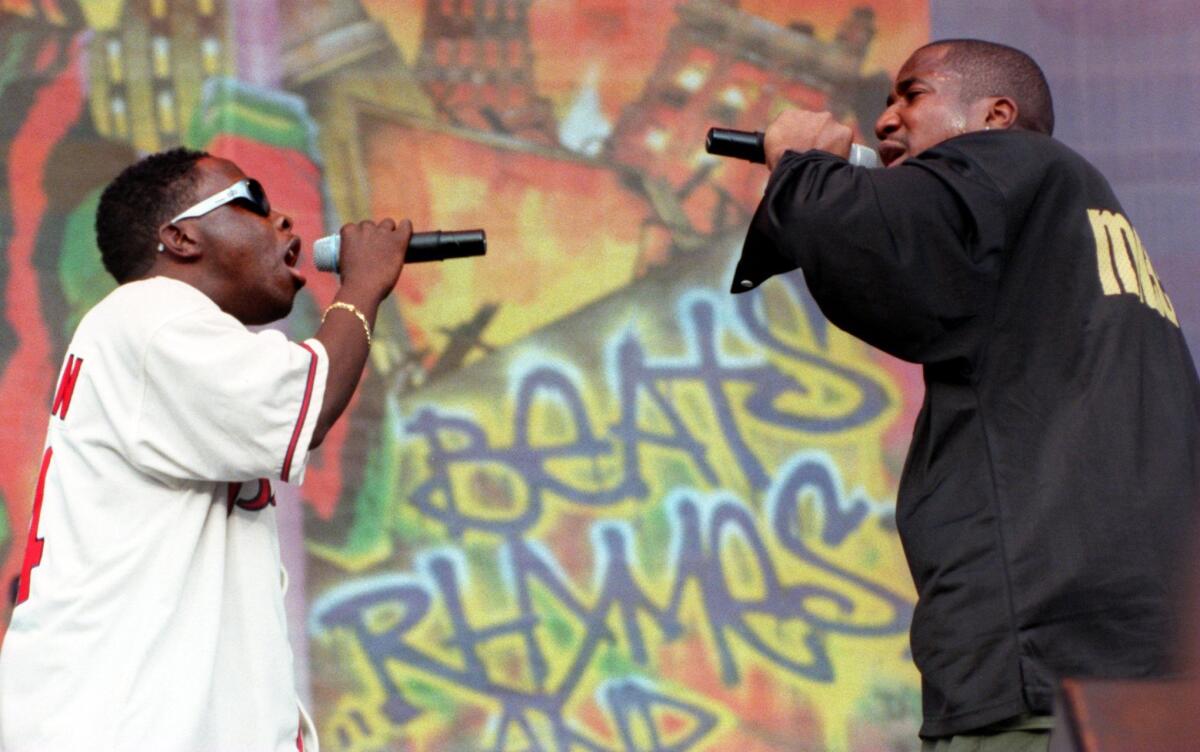From the Archives: When A Tribe Called Quest became rap’s gold standard by bucking hip-hop trends

A Tribe Called Quest performs at the Smokin’ Grooves Tour at the Universal Amphitheatre in 1998.
- Share via
Note: This article was originally published on Sept. 1, 1996. We have republished it in memory of Phife Dawg's recent death.
As Phife, who offstage is the most understated member of the hit rap group A Tribe Called Quest, shops for clothes in a trendy Beverly Center haberdashery, he notices that a teenage girl is staring at him.
Nearby, a beefy security guard who had accompanied Phife and the rest of the trio to the mall in their stretch limo frowns at the girl, hoping to send a signal that the rapper doesn't want to be disturbed.
"You guys sing or something, right?" the girl finally says to Phife, ignoring the guard's menacing presence.
Phife smiles.
Despite being a member of one of the most acclaimed groups ever in hip-hop, the 25-year-old New Yorker is used to having to identify himself — even to rap fans.
"We're in A Tribe Called Quest," he says politely. "We're performing in town tonight."
Even though the trio has stretched the boundaries of hip-hop music with each of its four albums, Quest has only recently joined the ranks of rap's commercial elite.

The group's "Beats, Rhymes and Life" album entered the national sales chart at No. 1 last month, and Quest's label, Jive, predicts the package could reach a million in sales by the end of the year.
"Beats, Rhymes and Life," A Tribe Called Quest's fourth album, has much in common with 1993's million-selling "Midnight Marauders." Relying less on purely jazz-based rhythm samples, stripped-down beat tracks are the emphasis, often with vibrant, melodic bass lines holding the overall shape of the track.
Q-Tip and Phife, who are respected for their imagery as much as their positivity, both shine throughout. The earthquake boom beneath "Get a Hold," the upright-bass-tinged "The Hop" and the boogie-woogie electric guitar pushing the East Coast/West Coast unity song "Keep It Moving" help move both brains and bodies. Only the butter-soft, lackluster "Stressed Out" and the dull "Word Play" (both of which seem like afterthoughts) detract from a noteworthy effort.
Phife and his colleagues Q-Tip and Ali Shaheed Muhammad seem flattered by all the attention, but popularity alone has never been their prime motivation.
When the idea of black urban reality in hip-hop was represented by artists donning gold rope chains and screaming lyrics full of nihilism and misogyny, Quest bucked the trends with flower print shirts and songs filled with spirituality and hope.
If the group's albums failed to chalk up the double- and triple-platinum figures of some of its rivals, Quest still enjoyed tremendous respect within the creative rap community. Q-Tip and Phife share rapping duties, while Ali is the deejay onstage and the producer in the studio.
"When the new videos would come to the studio and we would have meetings, Jac Benson and I would always say, 'These guys should have a Buzz Clip,' " says Fab Five Freddy, the founding host of "Yo! MTV Raps" and a longtime fixture on the New York hip-hop scene.
"I have respect for a group like [Quest] who can persevere for as long as they have," he says. "They have a humble patience that has kept them grounded, and now they're in a position to get the props they should have had a long time ago."
The props these days range from a four-star lead review for the album in Rolling Stone to rave notices on the Smokin' Grooves tour, which comes to Irvine Meadows Amphitheatre on Monday.
What have all these accolades done to the members of the group?
Ali, 26, feels the new album remains true to the group's vision.
"This record is meant to uplift — not to glorify the materialism and the weed smoking that's so common in rap," he explains. "We're not knocking people who live that lifestyle, we're just trying to beat back those forces with righteousness and the positivity of the heart."
Living just a few houses apart in St. Albans, Queens, a 40-minute subway ride from Manhattan, Phife and Q-Tip were middle-class kids who for the most part were sheltered from the crime and poverty that shaped the worldview of many rappers over the last decade.
That didn't prevent the youngsters, however, from having hip-hop dreams, fueled by the rhymes of such New York old-school heroes as Melle Mel, Cowboy, the Cold Crush Brothers and the Funky Four Plus One.
Though they loved the music, they didn't dream as teenagers that they'd ever be making records themselves. In fact, Q-Tip (whose legal name is Kamaal Fareed), 26, enrolled at Manhattan's Murray Bergtraum High School for Business Careers.
Ironically, it was there that he found a hotbed of future rappers. Between classes, he would freestyle with his friends — including Michael Small and Nathaniel Wilson, who would later become the key members of the Jungle Brothers, and Jason Hunter, who as Brother J helped form the black power rap group X-Clan.
But Q-Tip found his future when his old neighborhood pal Phife started the group A Tribe Called Quest in 1988 and invited him to be a part of it. Ali, a classmate at high school, joined them shortly after.

A year later, the Quest crew (including Jarobi, who left the group in the early '90s) began making appearances on Red Alert's groundbreaking hip-hop show on WRKS-FM in NY, and the disc jockey introduced them to De La Soul, a group that shared Quest's musical and philosophical views.
Signed by Jive Records, the home of R. Kelly and Too Short, Quest released its debut album in 1989. The collection, "People's Instinctive Travels and the Paths of Rhythm," was a remarkably inventive affair that featured samples of everyone from Grover Washington Jr. and Lou Reed to Jimi Hendrix and the Beatles.
The album is widely credited with spearheading the "alternative" movement in rap that has produced such other admired and eclectic acts as Arrested Development, Digable Planets and the Fugees.
Most of these groups broadened rap's funk music base by introducing new elements — from rock and jazz to playful samples of TV game show themes. They also brought a spiritual and introspective tone to the lyrics.
The members are proud of their accomplishments and of helping prove wrong all the doubters who in the '80s kept insisting that rap was just a fad that would soon fade away.
"Groups like the Fugees and the Roots are doing different things with hip-hop and making it constantly evolve," Ali says with a touch of satisfaction. "Real hip-hop has no boundaries and it will never die as long as there are groups to give it a breath of fresh air and a strong, creative life."
Even though Quest's sound helped define the creative center of '90s rap, the group members didn't receive the national media attention of many of the groups they had influenced – including the Grammy-winning Arrested Development and Digable Planets.
But that's changing, thanks to the success of the new album.

And how do they like this new world of limos and security guards? Have the kids from Queens gone Hollywood?
"No," Ali says firmly. "The only reason we have the limo is because the record company has bombarded us all day with press and radio. We have security because we're a little bit more known, and it's just necessary."
When the same question is posed to Q-Tip, you get some soul searching.
As he stands outside a sporting goods store, hands in his pockets and eyes cast downward, he speaks of his frustration with the commercialization of rap these days.
"There's just more and more business and way more formula," he says. "That's what's changed about hip-hop."
When pressed, he even admits that he wonders sometimes about the group's sudden popularity spurt and whether the new album is as good as the earlier ones.
For the first time, a Quest album features tracks that seem purposefully radio-friendly. Songs such as "1nce Again" and particularly "Stressed Out" (featuring singer Faith Evans) don't push the cutting edge.
Asked about the latter song, Q-Tip shrugs and says quietly, "I don't feel greatly about that song either. We weren't even going to put it on the album."
But the group did put it on the album, he says, because advisors pointed out how the tune could attract a new audience to the group. Still, he stands behind the new collection.
When it's time to head over to the Universal Amphitheatre for Quest's set on the Smokin' Grooves tour, Q-Tip's mood seems to brighten. He's looking forward to performing their songs.
Later, during the show, the audience cheers as Quest performs the accessible "1nce Again."
But then Quest goes into "Bonita Applebum," a tender ballad from the first album that reflects much of the integrity and heart that has made the group so admired. The audience response is even stronger than for "1nce Again," suggesting that the fans attracted by the softer moments of the new album will also appreciate the more substantial elements in Quest's music.
"I just hope that they say years from now that we changed hip-hop for the better the same way that Teddy Riley took R&B somewhere else," says Ali, reaffirming the group's long-standing ideals. "We would feel really good about that."
The biggest entertainment stories
Get our big stories about Hollywood, film, television, music, arts, culture and more right in your inbox as soon as they publish.
You may occasionally receive promotional content from the Los Angeles Times.





